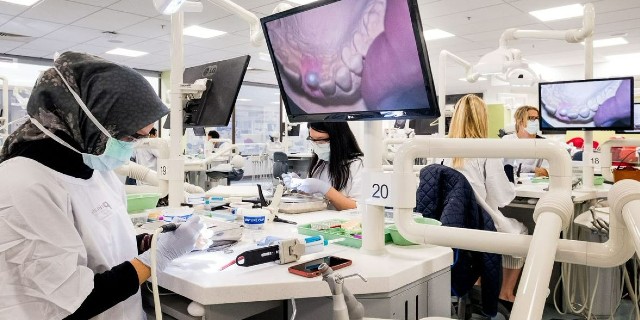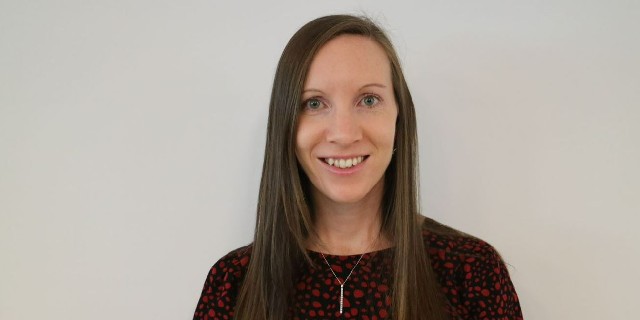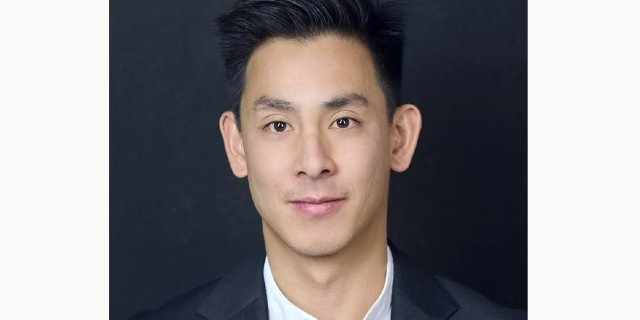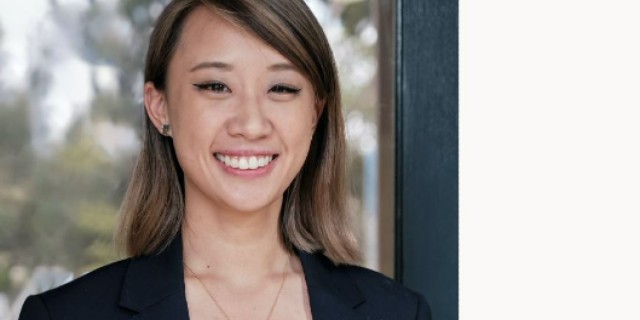Finding New Ways Forward
From uncovering how specific rainforest compounds can accelerate wound healing to better managing the dental care of people with special needs, the research undertaken within Melbourne Dental School is diverse and impactful.

Melbourne Dental School has a long history of supporting early career researchers who are keen to investigate important issues and to produce findings that can have tangible effects on the practice of dentistry.
Here, three early career researchers share insights into their research and its potential.
-
Accelerating wound healing
Dr Rachael Moses, Research Associate at the Melbourne Dental School, completed her PhD in tissue engineering in 2016 at Cardiff University in Wales. She joined the University of Melbourne in July 2021 to work with Professor Alastair Sloan. Her research is primarily focused on how different natural compounds promote wound healing responses.
Before arriving in Melbourne in the middle of the pandemic, Dr Moses was already a regular visitor to Australia through her research. After obtaining her BSc (Hons) in biomedical sciences in 2011 and an MSc and PhD in tissue engineering, her PhD and postdoctoral research took her to north Queensland’s tropical rainforests.
There, Dr Moses investigated the Fontain’s Blushwood trees and the compounds within the seeds of the fruit that have been found to enhance wound healing processes.
Continuing her focus on wound healing, Dr Moses is now focused on developing 3D chronic wound skin models that can be used to more effectively and ethically screen emerging wound healing therapies.
Her work is partly funded by Medical Advances Without Animals, a charity that champions medical research that doesn’t rely on animal testing. At the recent Australasian Wound and Tissue Repair Society conference, Dr Moses received the Early Career Oral Presentation runner-up award and was named Early to Mid-Career Researcher of the Year.
“Tissue engineering fascinates me – the idea that instead of repairing things, can we regenerate them? I also love being in the lab carrying out research and analysing data – that’s my happy place,” says Dr Moses.
“The 3D skin models allow us to replicate the wound healing process and it can be more accurate than using rodent models where the tissue architecture and mode of wound healing is so different to humans. The 3D models don’t use any animal products at all – they’re a vegan version!”
Dr Moses is working within a new lab at Melbourne Dental School – the Sloan/Moses Lab – that is focused on tissue engineering and 3D models. The research can be applied to skin and, in the dental sphere, the research may help healing of the mucous membrane lining - the skin inside the mouth. Dr Moses says there is also potential to make a diabetic wound model.
“We have an ageing population and a higher prevalence of diabetes and obesity and these contribute to chronic wounds. In Australia, around 440,000 people suffer with a chronic wound every year and it costs $3 billion to treat,” says Dr Moses.
“If these 3D models can help find a better therapy more quickly, that would be a great thing.”
-
Meeting special needs
Dr Mathew Lim (PhD 2021, Doctor of Clinical Dentistry 2021) is President of the Australian and New Zealand Academy of Special Needs Dentistry. His research examines the subtle and hidden barriers that exist within Australia’s oral healthcare sector for people with disability and investigates how to overcome those barriers. Dr Lim is also a Senior Lecturer in special needs dentistry at the Melbourne Dental School.
Dr Mathew Lim belongs to a small community in the oral healthcare world that is advocating for people with disabilities to have greater access to effective care and treatment. It has been a long-time passion for Dr Lim.
“A certain small number of people gravitate to this field of dentistry – we get pulled in this direction. I became interested in this specific area during dental school and while I worked in general practice, I met patients who were anxious and some had mental health issues, physical disabilities or complex medical issues,” says Dr Lim.
“I felt I needed more training to work comfortably in that area and so I returned to Melbourne Dental School to specialise. I also wanted to understand why it was okay for me as a general dentist to treat people with special needs but why other dentists were reluctant to treat them.”
Dr Lim’s research has examined perspectives of the public dental workforce on the dental management of people with special needs. He’s looked at the perceived barriers and potential ways to overcome those. He has uncovered a range of reasons why dentists don’t treat this cohort of patients – from dentists feeling they don’t have enough experience to believing they don’t have the right equipment or enough time.
“But below that were feelings that dentists didn’t want to do harm – they felt referring off a patient was better for the patient because they felt they couldn’t give them the dental care they needed. That was a perspective that hadn’t been talked about before,” says Dr Lim.
Dr Lim’s research has also looked at whether there are simple measures that can better support dentists to treat people with special needs. He suggests specialist dentists providing additional support to general dentists by working within the same practice and improving training.
“I know a case where a specialist dentist in Queensland flew to Alice Springs and Darwin at different times to support dentists and in Adelaide there is a network of dentists who have upskilled and who have monthly meetings to discuss new protocols and case studies. I hope people within the public sector realise there are opportunities to break down barriers and that doesn’t have to involve major changes.”
-
Harnessing digital health
Dr Michelle Mun (BBiomedSc 2009, BSc 2010, DDS 2015) is an associate dentist in private practice and Chair of the Australian Dental Association Dental Informatics and Digital Health Committee. She lectures in digital health transformation in dentistry at the Melbourne Dental School. Dr Mun’s research interests are in digital health workforce development and optimising and harnessing dental data to enhance clinical treatments and practice and patient care.
Dentistry appealed to Dr Mun because she enjoyed working with her hands, being creative and talking to people – dentistry neatly combined those three areas.
“I also liked having short, discrete goals and projects. During a dental appointment you can fix something and have an impact,” says Dr Mun.
After graduating, she worked with the Victorian Aboriginal Health Service and with Gippsland and East Gippsland Aboriginal Co-Operative, then moved to private practice for a few years. Dr Mun then spent nine months at the University of Texas in Houston, pursuing her interest in technology and its potential in dentistry by completing a Graduate Certificate in Biomedical Informatics.
“I’ve always been interested in technology, computers and coding. I was motivated to pursue informatics after joining the ADA Dental Informatics and Digital Health Committee that informs ADA Federal about the digital health landscape in Australia and how that can be applied in the dental profession,” says Dr Mun.
“In dentistry, digital health can include using digital dental tools like intraoral scanners and it can include information management systems like practice management software and electronic dental records. It can also include digital tools for patient education or for education in dental schools – it’s a broad term.”
Dr Mun says there is growing recognition that dental schools need to train health professionals who are ‘digital health capable’, who can use digital technology effectively and adapt to inevitable and rapid changes in technology. As part of this, she is embedding digital health content into the Melbourne Dental School dentistry curriculum.
She has a number of research areas that she wants to pursue to continue to progress digital health in the curriculum in Melbourne Dental School. She’d like to see the information systems of different health professionals become more integrated and less siloed to enhance patient care and research.
“There is global recognition that digital health is very important and dental informatics is relatively nascent, so it’s an exciting time to be in the field,” says Dr Mun.


